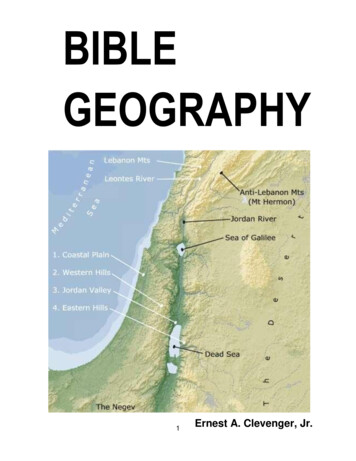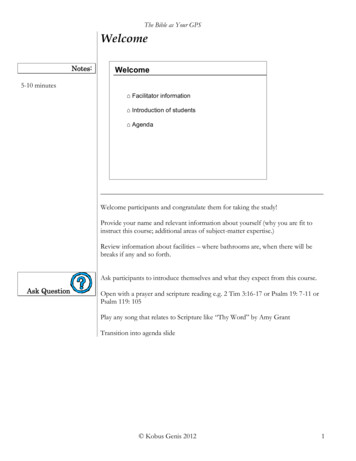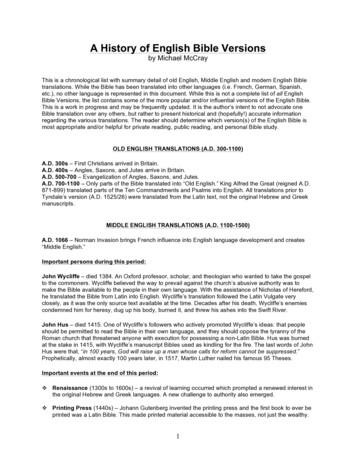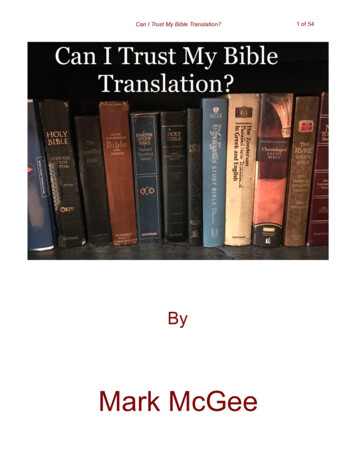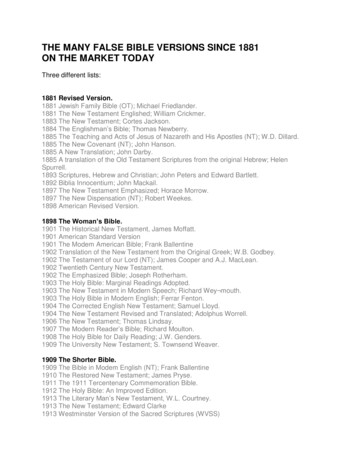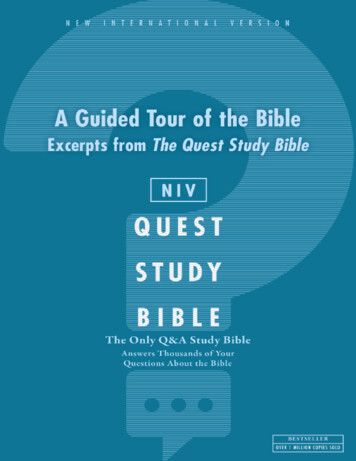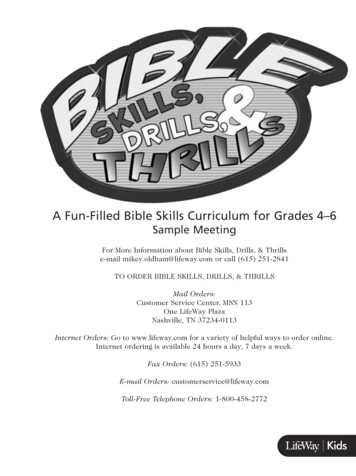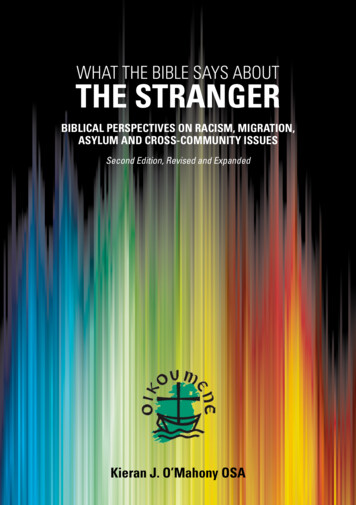
Transcription
WHAT THE BIBLE SAYS ABOUTTHE STRANGERBIBLICAL PERSPECTIVES ON RACISM, MIGRATION,ASYLUM AND CROSS-COMMUNITY ISSUESSecond Edition, Revised and ExpandedKieran J. O’Mahony OSA
WHAT THE BIBLE SAYS ABOUTTHE STRANGERBIBLICAL PERSPECTIVES ON RACISM, MIGRATION,ASYLUM AND CROSS-COMMUNITY ISSUESSecond Edition, Revised and ExpandedKieran J. O’Mahony OSA
For my parents who know how to welcome2nd edition, 2009ISBN 978-0-9562795-0-7[ISBN of First Edition: 0 905911 28 8]Published by the Irish Inter-Church MeetingProduced by AICCMR, the All-Ireland Churches’ Consultative Meeting on Racism,which comes under the aegis of the Irish Inter-Church Meeting, 48 ElmwoodAvenue, Belfast BT9 6AZ, phone 028 (048 from Republic) - 90 66 31 45,e-mail info@irishchurches.org and website www.irishchurches.orgWe are grateful to the following who helped fund this publication: Jesuit Centrefor Faith and Justice, Jesuit Refugee Service, Trócaire, Christian Aid, PA Foundation.
TABLE OF CONTENTSCeltic Blessing for Hospitality2Preface2Some terms explained4Introduction: The Tower of Babel61: The Pentateuch92: The History of Israel and the Prophets143: The One God of All Creation184: The One God of All Nations225: The Book of Ruth276: The Wisdom Literature307: The Gospels368: Other New Testament Writings42Conclusion: Pentecost47The Kingdom (R.S. Thomas)49Index of Biblical Citations50How to use this Guide52Resources67WHAT THE BIBLE SAYS ABOUT THE STRANGER / 1
CELTIC BLESSING FOR HOSPITALITYI saw a stranger yestreen,I put food in the eating placedrink in the drinking placemusic in the listening placeand in the sacred name of the TriuneHe blessed myself and my housemy cattle and my dear onesand the lark said in her songoften, often, oftengoes the Christ in the stranger’s guisePREFACEThe world has recently marked the sixtieth anniversary of the Universal Declarationof Human Rights, which dates from 10 December 1948. The importance of thisdocument has not decreased in the sixty years since it was written. On the contrary, itsimportance has grown, and its full significance has yet to be realised. As we becomemore and more conscious of being one world, we are increasingly aware of our commonhumanity. We are moved by the vision of a common ideal and by the desire for commonstandards for all persons irrespective of race, religion or jurisdiction. The UniversalDeclaration of Human Rights expresses this in its very first two articles.Article 1All human beings are born free and equal in dignity and rights. They areendowed with reason and conscience and should act towards one anotherin a spirit of brotherhood.Article 2Everyone is entitled to all the rights and freedoms set forth in this Declaration,without distinction of any kind, such as race, colour, sex, language, religion,political or other opinion, national or social origin, property, birth or other status.Furthermore, no distinction shall be made on the basis of the political, jurisdictionalor international status of the country or territory to which a person belongs,whether it be independent, trust, non-self-governing or under any otherlimitation of sovereignty.2 / WHAT THE BIBLE SAYS ABOUT THE STRANGER
Religion continues to be a powerful persuader in our societies. This is increasinglyrecognised in our post-modern world. One of the tasks of believers is to look to theirfoundational texts and see how the urgent human and ethical questions of the day arereflected in them. In the case of the Christian churches, our classic text is the Bible,which, significantly for our theme, is itself multi-cultural, both Jewish and Christian,in origin. The very collection itself is “trans-national”, in a manner of speaking.What does the Bible have to say about the way foreigners and refugees are treated?What does the Bible have to say about cross-cultural and cross-community issues?Given that the Bible is both a reflection of human experience (static fact) and a resourcefor profound change (dynamic ideal), we find in the Bible both the fact of discriminationand ethical ideals which challenge and eventually undermine any abuse of other humanbeings on the grounds of race, religion, gender and so forth. Thus we may find for todaymaterial in the Bible which helps us to recognise discrimination and arms us in thestruggle against it. Since the first edition of this study guide ten years ago, the urgencyof the issues addressed has grown.For our Irish context, where discrimination on the basis of religion has not beenunknown, it seems important to add that, while here we are dealing primarily withracism, immigration and asylum seeking and therefore, in the first instance, withforeigners who come to our shores, cross-community issues are not at all to beexcluded. It is often the case that the near neighbour is a greater stranger than the(safely) distant foreigner.The sections below follow the standard divisions of the Bible. The approach here is toallow the different experiences and voices to be heard in their literary and historicalsettings, with all their individuality. The sheer variety permits us to see the issue inan enriching kaleidoscope of perspectives.Since this study guide was first published, much has changed on the island of Ireland.Then we were at the beginnings of a great wave of immigration into the country,reversing the trend of almost two centuries. The prescience of those who commissionedthe guide meant its publication was timely. Just now, the economic boom has wanedand resentment against foreigners “taking our jobs” is once more likely to make itselffelt. In changed circumstances, I hope this project proves timely once again. I wouldlike to acknowledge the generous help of the committee which oversaw the newedition of this study guide: Sr Joan Roddy, who oversaw the project, Ms Stella Obe,Rev Katherine Meyer (who wrote the prayers at the end of each section), Pastor KunleDaniel and Rob Fairmichael (who provided the dramatisation descriptions as well as theexercises at the end). In the original edition Rev John Byrne OSA provided the pointersWHAT THE BIBLE SAYS ABOUT THE STRANGER / 3
for reflections, which have been brought up to date. Very special thanks toDr Carmel McCarthy RSM who kindly proofread the final text.Note on the Translation of the Bible UsedThis study guide uses the New Revised Standard Version, which is an ecumenicaltranslation. Occasionally, reference has been made to the so-called “Apocryphal/Deuterocanonical” books, used by the Anglican, Catholic and Orthodox Churches, butnot by the Reformed Churches. Readers who do not regard these books as authoritativeare invited to treat them as further echoes, within the Jewish tradition, of themes foundin the Hebrew Bible. Once or twice, the reader will notice the name of God from theHebrew Bible - YHWH - but it is left without vowels, respecting Jewish tradition.SOME TERMS EXPLAINEDApocrypha is the name given to those biblical books not written or handed downin Hebrew, which were regarded by many at the Reformation to lack the authorityof the books written in that language. In churches that accept them, the termDeuterocanonical, meaning the second canon, is used in recognition of theirorigin in the Greek Old Testament (the Septuagint).BCE and CE stand for “before the common era” and “the common era”. These termsare sometimes used instead of BC and AD in recognition of religious traditions otherthan the Christian one.Exile within the biblical narrative refers most obviously to the Babylonian Exile(587-539 bce), even though there were other deportations and exiles.Hebrew Bible is often used nowadays for the Old Testament, recognising that thisis the Bible of the Jewish people. The reference does not include the Apocryphal/ Deuterocanonical books.Henotheism is the conviction that our God is one, whatever about the god(s) of otherpeoples and tribes. See monotheism.Jubilee Year refers to a provision in the Hebrew Bible for the cancellation of debtsevery fifty years, giving people a regular opportunity to start afresh. It is a developmentof the agricultural sabbatical year. However, it is not known how much it was everypractised.4 / WHAT THE BIBLE SAYS ABOUT THE STRANGER
Monotheism is the conviction that our God is the only God. Adjective: monotheistic.See henotheism.Myth in the popular use means something not true. In the world of religious studies, amyth is a symbolic story, which helps us engage more deeply with reality. For example,the Garden of Eden is a myth or mythical story because it names realities with whichwe have to deal in life.New Testament is the second half of the Christian Bible, a collection of Gospels,letters and others writings, produced by the early church.Old Testament is a Christian term for the Jewish Bible. At the time of Jesus it wassimply “the Bible”, as the New Testament had yet to be written. The Old Testament hasalways been used in Christian worship.Pentateuch refers to the first five books of the Hebrew Bible, from Genesis toDeuteronomy.Resident alien is the translation of a Hebrew expression, meaning sojourner, that is,someone living outside his/her own country, an immigrant. The ancient Israelites werereminded in the Bible to respect the immigrant, because they too had been immigrants.The law reminded the Israelites to protect the rights of the sojourner in their midstbecause they were always to remember that they too had been sojourners in Egypt(Exod 22:21; cf. Deut 10:18–19; 24:17–22).Second Isaiah is used to refer to Isaiah 40-55, a section thought by many scholarsto have been written later and added to the original Isaiah.Septuagint is the name given to the Greek translation and expansion of the HebrewBible, which took place in Alexandria (Egypt) around 200 bce. The number of bookstaken from the Septuagint varies from church to church, with the Orthodox takingmore and the Catholics taking fewer. The symbol LXX is shorthand for the Septuagint,which means literally seventy.Wisdom Literature or Wisdom Books is a term for certain books of the Bible,with a special interest in universal human experiences. In the Hebrew Bible theseare: Proverbs, Ecclesiastes (Qoheleth), Job and many Psalms. In the Greek OldTestament (the LXX) these are: the Wisdom of Solomon, Sirach (Ecclesiasticus)and the book of Tobit.WHAT THE BIBLE SAYS ABOUT THE STRANGER / 5
INTRODUCTION: THE TOWER OF BABELExpressions such as discrimination and racism are not found in the Bible. Althoughthese modern “-isms” and “-tions” were unthought of and perhaps unthinkable inantiquity, the realities to which they refer and the ethical questions raised by themare very much present in the Bible.In ancient times, people were not unaware that there were differences betweennations. Colour, language, religion, tribe and territory all play their part in the biblicalview of the outsider, called in some modern versions of the Bible, the “alien”. Forexample, one of the most memorable tableaux of the Hebrew Bible reflects on thepuzzle of the variety of languages. The story of the Tower of Babel (Genesis 11:1-9)belongs to a category in ancient writings known as an etiological tale. This meansa tale which is used to explain some puzzling aspect of life. For instance, why isthere pain in childbirth (Genesis 3:16)? Why do Hebrews not eat the sinew on thehip (Genesis 32:32)? In the story of the Tower of Babel, why are there so manymutually incomprehensible languages?The story ends with the common experience: confusion of tongues, as anybody whohas tried to learn a foreign language or been abroad experiences. But the story startswith the human race originally sharing one common language. This idealised pictureof perfect mutual comprehension had never been experienced by anyone, except inminiature within one’s own culture. So, what happened to bring about the change?According to the story, the humans became very confident of themselves and wanted tobuild a tower right up to heaven. In mythological terms, this makes the deity sufficientlyanxious for “God” to put a stop to their co-operative efforts by the simple and effectivedevice of introducing a variety of tongues. Co-operation is no longer possible and theproject has to be abandoned. In psychological terms, human pride has led to a stateof affairs where people no longer understand each other and can no longer worktogether. In a story used to explain the origin of diverse languages, we stumble acrossan observation which is as true today as ever it was: a distorted sense of our ownimportance creates mutual incomprehension and renders co-operation impossible.“Not speaking the same language” can be taken literally (a linguistic fact) ormetaphorically (a mutual incomprehension). We read in Psalm 114,“When Israel went out from Egypt,the house of Jacob from a people of strange language,Judah became God’s sanctuary,Israel his dominion.” (Ps 114:1-2)6 / WHAT THE BIBLE SAYS ABOUT THE STRANGER
The phrase in italics reflects not just the fact of being abroad but, more pointedly,the pain of alienation. Those of us blessed with a sense of been at home may notappreciate the suffering of those who have being obliged to move home and life.Often, the person who has changed culture experiences a double alienation, like theIrish who are at home neither in Britain nor in Ireland. Even worse, the new context ofunfamiliarity and foreignness (“not the same language”) can foster suspicion and allowfear to flourish.The story of the ShibbolethLinguistic awareness is often the first sign of the stranger and the refugee. Evena slightly different intonation can tell the native speaker much. A rather terrifyingreflection of this everyday experience may be found in a story from the book ofJudges 12:1-6.“The men of Ephraim were called to arms, and they crossed to Zaphon and saidto Jephthah, “Why did you cross over to fight against the Ammonites, and didnot call us to go with you? We will burn your house down over you!” Jephthahsaid to them, “My people and I were engaged in conflict with the Ammoniteswho oppressed us severely. But when I called you, you did not deliver me fromtheir hand. When I saw that you would not deliver me, I took my life in my hand,and crossed over against the Ammonites, and the LORD gave them into my hand.Why then have you come up to me this day, to fight against me?” Then Jephthahgathered all the men of Gilead and fought with Ephraim; and the men of Gileaddefeated Ephraim, because they said, “You are fugitives from Ephraim, youGileadites - in the heart of Ephraim and Manasseh.” Then the Gileadites took thefords of the Jordan against the Ephraimites. Whenever one of the fugitives ofEphraim said, “Let me go over,” the men of Gilead would say to him, “Are you anEphraimite?” When he said, “No,” they said to him, “Then say Shibboleth,” andhe said, “Sibboleth,” for he could not pronounce it right. Then they seized him andkilled him at the fords of the Jordan. Forty-two thousand of the Ephraimites fell atthat time.” (Judg 12:1-6)In a tale which echoes Judges 8:1-3, the Ephraimites challenge Jephthah,because he did not call on them for help. In the ensuing battle, the Ephraimiteswere roundly defeated and the ethnicity of the survivors is betrayed because theycannot pronounce the word shibboleth properly. Those identified are slaughtered.As is said of Peter in the Gospel, “your accent betrays you” (Matthew 26:73).WHAT THE BIBLE SAYS ABOUT THE STRANGER / 7
QUESTIONS FOR REFLECTIONLanguage remains a potent symbol of both mutual incomprehension and mutualenrichment. It is always more than just the words - a culture, a society and a wayof looking at the world are all encapsulated in a language.(1) What has my own experience of being a foreigner been? How did I feel?What helped me to cope?(2) When has another person’s language made communication difficult for me?How did I cope? It is not just the language as such: there can also be issuesof professional jargon, the generation gap, gender differences?(3) Language is only one example of blocked communication. What about otherobstacles, for instance, racial background, economic statue, sexual orientationor religious affiliation? How have I myself experienced these challenges andcoped with them?(4) Difference of culture and experience is, at the same time, an enhancement.When has the difference of others been a source of enrichment and joy for me?(5) What has helped me personally to set aside suspicion and be more opento people who are different?PRAYER (Genesis 11)God, who speaks and whose sudden word creates our lives,your name is unpronounceableand yet spoken in many tongues.And so we pray:Whoever we are,and by whatever name you have called us,teach us to speak with fluency the language of praise,so that we may hear,and recognise one another at last.8 / WHAT THE BIBLE SAYS ABOUT THE STRANGER
1: THE PENTATEUCHThe first five books of the Bible (the Torah according to Jewish tradition or in Christiantradition the Pentateuch) contain material which seems to be in tension with itself.At a surface level, we have a national epic with three broad elements: the nomadiclife of the tribes (Abraham, Isaac, Jacob), the Egyptian period (Joseph and succeedinggenerations), the period of the Exodus and the possession of the Promised Land(Moses, Aaron and Joshua). The latter stages of the national epic recount a great dealof invasion, battle and extermination. At another level, an ethical concern emerges,in particular towards the defenceless and the exiled (the orphan and the widow,the resident alien). Part of the motivation of this ethical concern comes from therecollection of having been yourself in exile, of having suffered yourself. Going throughthe same experience yourself can promote understanding and compassion.In the early period of the patriarchs, the family of Abraham is nomadic. They live withtheir flocks and by their wits. To capture something of the flavour of their life, onecould read Genesis 12 and 13. In the end, after experiencing deep family division andlater severe famine, the family of Jacob joins his son Joseph in the safety and relativeprosperity of Egypt. It turns out that Joseph, the immigrant, is a source of blessing notonly for his own family, but for the host country as well. By means of Joseph’s gifts as afar-seeing administrator, Egypt prepares well in seven years of plenty for another sevenyears of famine to follow (Genesis 41). A long time after Jacob’s family first arrived inEgypt, a king arose who “did not know Joseph” (Exodus 1:8), a phrase with an ominousring to it. This Pharaoh began a systematic extermination of the Hebrews, apparently onthe all too familiar grounds that these foreigners were becoming “too many” (Exodus1-2). Although frustrated by the Hebrew midwives in his wish to kill all male children atbirth, this Pharaoh did make life miserable for the Hebrews, forcing them to make morebricks while simultaneously withholding the materials necessary. Exclusion froma means of livelihood has often been the experience of the exile and the refugee.Eventually, in the book of Exodus, God expresses concern in the pregnant words “Iknow”. God is speaking to Moses and calls on him to be the instrument of liberation.God is portrayed as a God who feels and notices suffering, whose desire is for hispeople to be free, who holds out to them a different future in a land to which he willbring them (Exodus 3). After various vicissitudes, the Hebrews eventually manage toescape across the Red Sea, although it will be another forty years before they actuallyenter the land. (It is during this wandering in the desert that the Ten Commandmentsand much of the ethical material are described.)WHAT THE BIBLE SAYS ABOUT THE STRANGER / 9
The violent entry into the land is described with a forthrightness that leaves little doubtabout the lack of sympathy for those who always lived there. They are to be destroyed.It even says that their destruction will be an acting-out of God’s will (Exodus 23:20-33).Fortunately, this very violent expression is in contrast with a much more acceptingattitude elsewhere in the very same Bible. The word of God also teaches compassionand understanding towards the immigrant. As we might expect, this more ethicalteaching is based on the memory of having been an alien. Time and time again in thePentateuch we are reminded that the Israelites were aliens themselves. Abraham, thegreat forefather, had been a “wandering Aramean” (Genesis 12; Deuteronomy 26:5).“You were once aliens and slaves yourselves” (Deuteronomy 10:19-22; 24:17-22; Exodus22:21-24; 23:6-9; Leviticus 19:33-34). On the basis of that painful memory, “you are tobe merciful to the stranger in your midst”. In particular the resident alien is accordedcertain religious and political rights, as well as duties. The alien is entitled to a day ofrefreshment in the week (Exodus 23:12) and may keep the Passover (Leviticus 19:34). Aspecial consideration is recommended when harvesting, in that aliens with no means ofsupport are to be left the gleanings (Leviticus 23:22; Deuteronomy 24:19; Ruth 2). Evenslaves have rights (Exodus 21:1-11).This combination of religious tolerance and economic assistance comes to a climax inthe arrangements for the Jubilee Year. This is the year when debts are cancelled andslaves are to be set free. This merciful attitude is highly ethical and the basis for it ismade plain in three texts in the Torah, which are themselves arresting:“You shall also love the stranger, for you were strangers in the land of Egypt.You shall fear the Lord your God; him alone you shall worship; to him you shallhold fast, and by his name you shall swear. He is your praise; he is your God,who has done for you these great and awesome things that your own eyeshave seen. Your ancestors went down to Egypt seventy persons; and now theLord your God has made you as numerous as the stars in heaven.” (Deut 10:19-22)“The alien who resides with you shall be to you as the citizen among you; youshall love the alien as yourself, for you were aliens in the land of Egypt: I amthe Lord your God.” (Lev 19:34)“For both the native among the Israelites and the alien residing among them-youshall have the same law for anyone who acts in error. But whoever acts highhandedly, whether a native or an alien, affronts the Lord, and shall be cut offfrom among the people.” (Num 15:29-30)10 / WHAT THE BIBLE SAYS ABOUT THE STRANGER
The ancient Israelites are commanded to love God, to love their neighbours asthemselves, and even to love the stranger to the same extent. The ancient Israelites arenot only reminded that they too (in their ancestors) had been aliens, but they are relatedto the Edomites (traditional enemies-Deuteronomy 23:7) and even the Egyptians are tobe treated well-in spite of everything! The practical expression of this love is equalitybefore the law (Deuteronomy 27:19). The alien, as much as the native, can expect toreceive fair treatment and justice. How much the jubilee year was practiced is notknown. At the very least, it articulates values and represents an ideal.Another institution in ancient Israel has a bearing on the question of justice: the cityof refuge. The guiding texts here are Exodus 21:12-14 and Deuteronomy 19:1-13. Thiswas a system whereby those guilty of accidental homicide could seek legitimate asylumin a certain number of named cities. In this way, the perpetrators of what we wouldcall “manslaughter” are protected from the full rigour of vengeance for a murder. Thatsense that there are places where one might escape injustice is a striking part of thecovenantal relationship within Israel. A place of refuge and asylum is envisaged, evenif only in special circumstances.The Pentateuch itself then contains apparently contradictory traditions. The narrativetradition recounts violent escape from Egypt and the violent invasion of Canaan. Mercyis not to be shown, except in well-advertised cases such as Rahab and her family. Onthe other hand, an ethical tradition is clearly present, one which, to our ears, comesclose to the present-day language of human rights. How both traditions come to be sideby side in the same set of texts may be a matter of time and politics. The great nationalstory takes us back to somewhere in the thirteenth century BCE. The actual writingdown of the story in the form we now have it is usually dated to the Exile (587 BCE) oreven later. Thus a long period of maturation and a sharper, more recent experience ofexile has tempered the imperialism of the early account. And by now, the Israelites,once again, are no longer in control of their own territory. Even the return from exileitself this time was permitted by Cyrus, “the Lord’s anointed”, literally “messiah” whowas a Persian. It would have been a shock to have heard such a person hailed as “theChrist”, as Christians would put it! This double tradition means that we see in thetradition’s unvarnished imperialism, a kind of racism, alongside a moral reflection,which speaks with a much more nuanced, compassionate and ethical voice. TheBible exhibits a robust realism and is not afraid to portray the dark side of the humanexperience. The double tradition constitutes an invitation to recognise “ambivalentreality” but not to be bound by it.WHAT THE BIBLE SAYS ABOUT THE STRANGER / 11
The Story of Esau and JacobAs an example of the double tradition, the wonderful story of Esau and Jacob caninspire us today. Putting it mildly, the gripping saga told in Genesis 25-33 recountsthe experiences of a markedly dysfunctional family. Esau and Jacob are destined,from the womb, to be in conflict. To make the family relationships clear: Isaacand Rebecca have two sons, Esau and Jacob. Isaac prefers Esau and Rebeccaprefers Jacob and even helps him against her husband and other son. As the storyunfolds, Jacob robs Esau twice and once he deceives Isaac, his blind father. Inturn, Isaac prefers Esau and Jacob is the favourite of Rebecca. Laban - uncle ofJacob and brother of Rebecca - treats his daughters abominably. In turn, Racheldeceives her own father, but not before Jacob had yet again cheated his uncle andfather-in-law, Laban. In the course of this saga, Jacob, having alienated himselfthoroughly from his brother Esau, becomes himself an alien, living abroad. It isnot a very uplifting story - except perhaps for two outstanding moments. InGenesis 32:13-32, Jacob undergoes a deep spiritual experience, confrontingboth God and his own darkness. The marked changed is completed when hemeets his brother, a brother from whom he can expect the worst. In the courseof this potentially fraught encounter, Esau has the grace to release his brotherfrom his previous misdeeds:“But Esau ran to meet him, and embraced him, and fell on his neck and kissedhim, and they wept. When Esau looked up and saw the women and children,he said, “Who are these with you?” Jacob said, “The children whom God hasgraciously given your servant.” Then the maids drew near, they and their children,and bowed down; Leah likewise and her children drew near and bowed down;and finally Joseph and Rachel drew near, and they bowed down. Esau said, “Whatdo you mean by all this company that I met?” Jacob answered, “To find favourwith my lord.” But Esau said, “I have enough, my brother; keep what you havefor yourself.” Jacob said, “No, please; if I find favour with you, then accept mypresent from my hand; for truly to see your face is like seeing the face of God since you have received me with such favour. Please accept my gift that isbrought to you, because God has dealt graciously with me, and because Ihave everything I want.” So he urged him, and he took it.” (Gen 33:4-11)Jacob, the insider, recognised the face of God, the grace of God, in Esau, theoutsider. The words capture this tremendous moment. It could have been adisaster but Esau turns out to be a gift, gracious and forgiving.12 / WHAT THE BIBLE SAYS ABOUT THE STRANGER
QUESTIONS FOR REFLECTION(1) Within my own experience, can I name nationalities that have come to Irelandfor economic or political reasons? What word would describe the quality of myown interaction with immigrants, including people seeking asylum?(2) What do I know about the status of newcomers in the law, especially in regardto residence and the right to work? Have I met people who experience legalrestrictions as they try to build their lives here? What do I believe their standingin the law ought to be?(3) Look again at the texts that remind the Israelites of their own history of havingbeen aliens. Many nations have experienced expropriation and emigration.What are the parallels with your own national history?(4) Look again at the surprising biblical tradition of equal economic and religiousrights accorded to strangers? Is there a challenge here to our attitudes andour practice?(5) Take biblical accounts of the cities of refuge (Exod 21:13; Num 35:9-15;Deut 4:41-43; 19:1-13; Joshua 20; and 1 Chronicles 6). As an image ofasylum, what does this provision say to us today?(6) The stranger can be a source of blessing and grace. In what ways has itbeen my experience that the stranger, precisely as alien, can be a sourceof healing and grace?PRAYER (Genesis 25-33)God, whose hands are always open,it is from you that we receiveevery familiar and unexpected gift.And so we pray:Give to us also the gift of Esau’s non-anxious sight,so that recognising when we have everything we need,we may turn from ourselves,and discover that to meet the eye of anotheris to see your face and live.WHAT THE BIBLE SAYS ABOUT THE STRANGER / 13
2: THE HISTORY OF ISRAEL AND THE PROPHETSTeachings of any kind cannot be grasped without some idea of the context fromwhich they came. This chapter begins with a brief overview of Israelite history aspresented in the Bible and in the light of the surrounding cultures. The alternatingexperiences of power and disempowerment, which marked Israelite history
WHAT THE BIBLE SAYS ABOUT THE STRANGER / 1 Celtic Blessing for Hospitality 2 Preface 2 Some terms explained 4 Introduction: The Tower of Babel 6 1: The Pentateuch 9 2: The History of Israel and the Prophets 14 3: The One God of All Creation 18 4: The One God of All Nations 22 5: The Book of Ruth 27 6: The Wisdom

